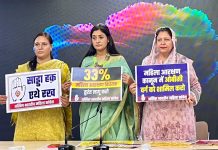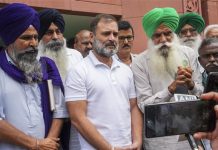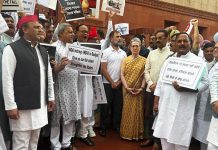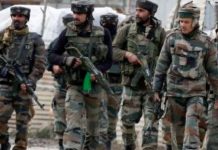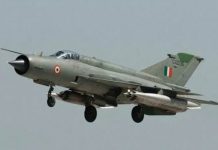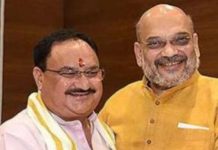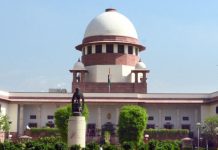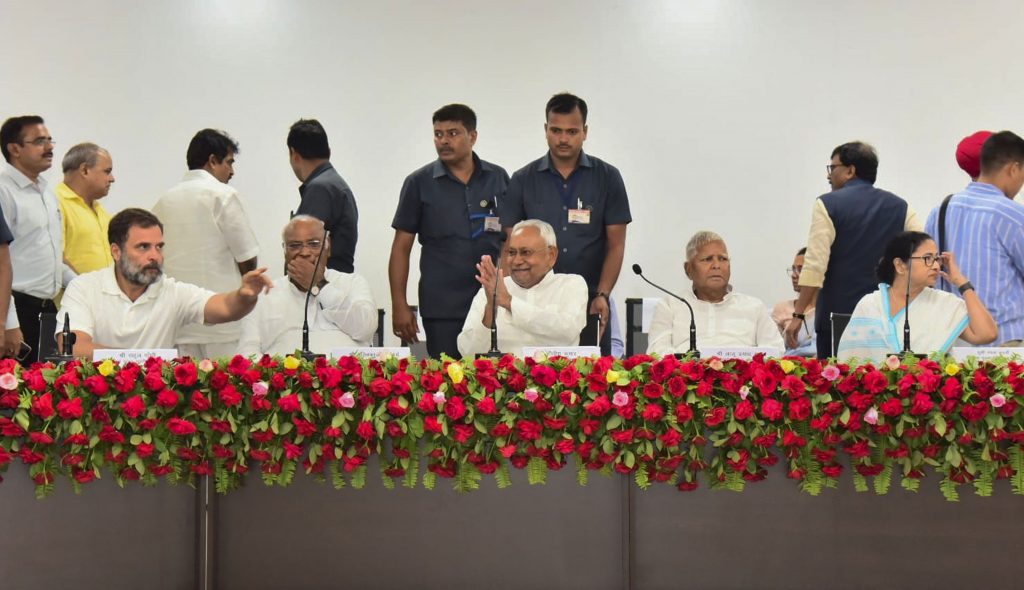
The opposition meeting in Patna on June 23 was significant in that 15 parties — some of them having divergent views on crucial issues — came together on a single platform and spoke in one voice over the need to fight the 2024 polls jointly against the BJP, writes Amit Agnihotri
As many as 15 opposition parties took the first concrete step towards an anti-BJP platform ahead of the 2024 Lok Sabha elections but would need to work out a common minimum program and sink their differences to keep the alliance intact.
The opposition meeting in Bihar’s capital Patna on June 23 hosted by chief minister Nitish Kumar was significant as the 15 like-minded parties came together on a single platform and spoke in one voice over the need to fight the 2024 Lok Sabha polls jointly against the BJP.
Earlier, there had been positive noises coming from these parties but there were doubts whether such a conclave would actually take place and even if that happened, if the meeting would send out a loud and clear message.
The press conference addressed by the opposition leaders after the four-hour long meeting showed that they were all focused on the joint poll fight next year and were prepared to work out the finer details of the alliance.
The opposition meeting was earlier scheduled to take place on June 12 but could not take place due to unavailability of some leaders, including Kharge and Rahul Gandhi, who was in the US.
On June 23, TMC leader and West Bengal chief minister Mamata Banerjee, AAP founder and Delhi chief minister Arvind Kejriwal, Punjab chief minister Bhagwant Mann, DMK leader and Tamil Nadu chief minister MK Stalin, PDP leader Mehbooba Mufti, former Congress chief Rahul Gandhi, Congress chief Mallikarjun Kharge, Shiv Sena UBT and former Maharashtra chief minister Uddhav Thackeray, party MP Sanjay Raut, NCP chief Sharad Pawar and NC leader and former Jammu and Kashmir chief minister Omar Abdullah attended the meeting.
“It was a good meeting where it has been decided to fight the 2024 elections together. Another meeting will be held soon. There was consensus on fighting elections together. Mallikarjun Kharge will lead the meeting next month. In that meeting, things like who will contest where will be finalised,” Nitish Kumar said.
“We will meet again in Shimla on July 10 or 12 to prepare an agenda on how to move ahead together while working in our respective states to fight the BJP in 2024,” Kharge said.
The issues that would be discussed between the parties over the coming days would include a common minimum program to be presented before the voters as a poll manifesto and more importantly, the seat sharing between the parties.
Over the past weeks, there have been internal discussions among the parties around Nitish Kumar’s one-on-one formula which means putting up a single opposition candidate against the BJP nominee in as many Lok Sabha seats as possible.
On the other seats, there could be a seat sharing between the regional parties and the Congress, the only national party in the opposition space, depending upon who was a strong player in the region.
On several seats, the Congress directly fights the BJP, and there, the opposition could help in whatever way possible.
However, this seat sharing is easier said than done as the stakes are high for both the Congress and the regional parties when the national polls come up.
Many regional parties fight state elections against each other in states for instance the TMC vs the Congress vs the CPI-M in West Bengal or the Congress vs SP in Uttar Pradesh, or the UDF vs LDF in Kerala, the seat sharing would need a lot of negotiations.
However, the initial success of the opposition meeting could be gauged from the fact that these divergent parties came together on a single platform despite the differences.
The reactions of the BJP, which had been dismissing reports of the conclave but strongly attacked the gathering later, also showed that the meeting had left the saffron party worried as the total votes combined of these 15 parties is more than the BJP’s national vote share.
Get together
The meeting saw several leaders speak out over the need for greater opposition unity ahead of the next general elections.
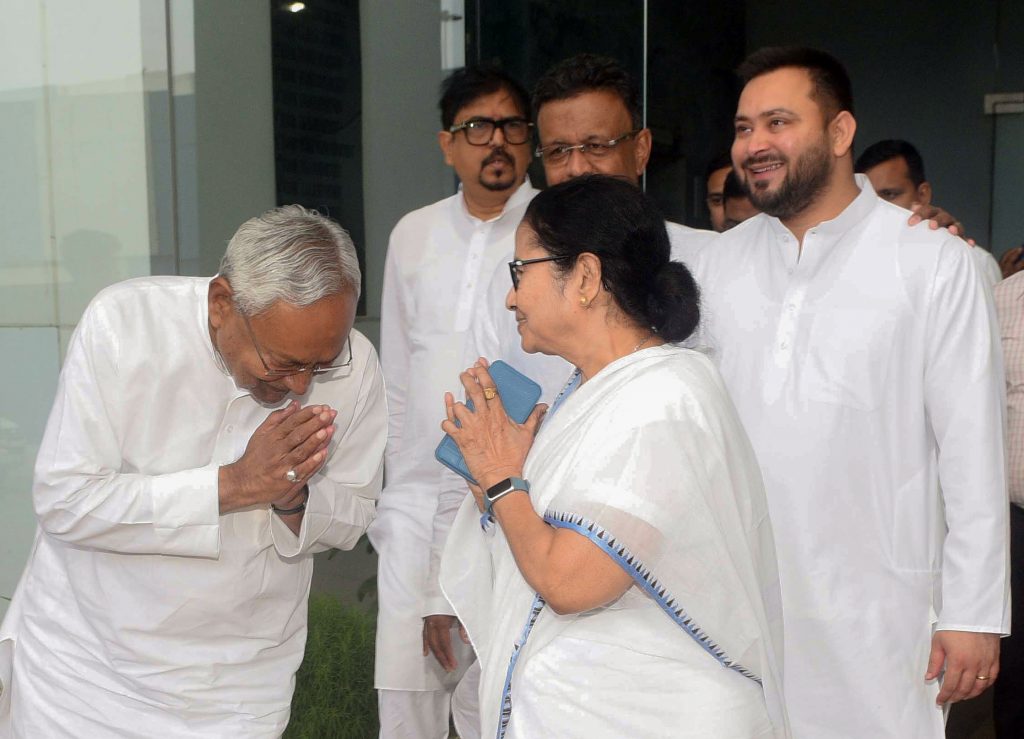
In a fiery speech, Mamata Banerjee slammed the BJP. “We are united, we will fight unitedly…The history started from here, the BJP wants that history to be changed. And we want history to be saved from Bihar. Our objective is to speak against this fascist government…,” the Trinamool Congress supremo said.
“Many CMs, ex-CMs are present at the meeting. It was well organised. All senior leaders are present here. I had suggested a meeting to be held in Patna. We are united. We will fight unitedly. Don’t call us Opposition. We are also patriotic, if Manipur burns, we feel pain,” the West Bengal chief minister said.
“The BJP’s atrocity, making Raj Bhavan as an alternative government. Anyone who dissents faces the Enforcement Directorate and the Central Bureau of Investigation,” she said.
“If this dictatorial government returns this time, there will be no elections in future,” the TMC supremo said. The first meeting of opposition leaders was organised in Patna as “whatever starts from Patna, takes the shape of the public movement”, she said. “We resolve that we all are united and will fight unitedly against the BJP,” she said and added that “the BJP wants to change history, but we will ensure history is saved.”
RJD chief Lalu Prasad Yadav said, “Lord Hanuman thrashed BJP with his mace in Karnataka and made Rahul Gandhi’s Congress party win.” He said Lord Hanuman was with the Opposition, and it was certain that BJP would face massive defeat in the upcoming polls.
“From Jammu and Kashmir to Kanyakumari, every like-minded party participated in the meeting. It is not the fight for power but for values and ideology. It was nice to hear the prime minister speaking about democracy in the White House. However, it’s regrettable that what could have been the reason that there was no democracy in Jammu and Kashmir?” said Omar Abdullah.
“The Republic needs to be reclaimed before it is lost. In order to save and reclaim the republic, we have all agreed, and we are of the same view that BJP has to be defeated in the forthcoming elections,” said Communist Party of India leader D Raja.
NCP chief Sharad Pawar and former Maharashtra chief minister Uddhav Thackeray made attempts to iron out differences between the Congress and AAP at the mega opposition meet. The two leaders cited the example of Maha Vikas Agadi unity. “We have been criticising each other for the past 25 years but we need to set every difference aside. We have kept it aside and now we are working together,” Pawar said.
“I don’t consider myself as Opposition. However, we’ll all oppose anyone who would attack the democratic values of the country and try to establish a dictatorship,” said Uddhav Thackeray, adding “the Patna meeting was a good start, adding he believed that everything goes well when it begins well.” He said the time had come to keep differences aside and come together.
Tamil Nadu chief minister MK Stalin said, “A consultative meeting of various opposition parties was held in Bihar to save India’s democracy. All opposition parties have a single goal to defeat BJP. No decision was made on the PM candidate in the meeting.”
Raising the pitch for a united opposition front in the 2024 Lok Sabha polls, Congress president Mallikarjun Kharge addressed party workers in Patna before the opposition meeting along with Rahul Gandhi.
Kharge noted that Rahul’s Bharat Jodo Yatra against BJP’s hate politics had borne fruit and brought the various opposition parties together to fight the ruling party.
The Congress chief also exhorted the party workers in Bihar to restrengthen the party in the state. “The Congress’ ideology can never be separated from Bihar. If we win Bihar, we will win India,” Kharge said.
Challenges before opposition
The inherent differences between some of the parties will pose a challenge before the proposed opposition front. This was reflected in the war of words between the Congress and the AAP before, during and after the meeting.
The AAP signalled a further deterioration in its strained ties with the Congress, saying that unless the latter publicly denounces the Delhi ordinance promulgated by the Centre it would be “very difficult” for it to be a part of any alliance that included the grand old party.
The BJP-led Centre’s Delhi ordinance takes control of administrative services from the Arvind Kejriwal-led AAP government in the national capital. The AAP leaders attended the joint meeting where Kejriwal raised the ordinance issue but was snubbed by NC leader Omar Abdullah.
TMC’s Mamata Banerjee also said that the ordinance was not the focus of the opposition meeting in support of Kharge who pointed out that the issue would be taken up during the parliament’s monsoon session. A miffed AAP later skipped the joint press conference addressed by the opposition leaders.
Later, in a statement released on Twitter, AAP condemned the Congress for not supporting it against the Delhi Ordinance. The statement said that “out of all the parties that attended the meet, 12 had representation in the Rajya Sabha. Except for the Indian National Congress all others have clearly expressed their stand against the ordinance and announced that they would oppose it in the Rajya Sabha.”
“The Congress, a national party that takes a stand on almost all issues, is yet to make public its position on the black Ordinance”, the statement read, adding that Delhi and Punjab units were of the view “the party should support the Modi government on the issue”.
Before that ex-Delhi Congress chief Ajay Maken strongly opposed the idea to back Kejriwal saying the AAP founder had supported the BJP over removal of Article 370 from Jammu and Kashmir and had advocated that Bharat Ratna be taken away from former prime minister Rajiv Gandhi.
In the past, Kejriwal has been severely critical of both Sonia Gandhi and Rahul Gandhi and had attacked the Congress saying the grand old party was not able to take on the BJP. The TMC and the SP too had similar views.
After the opposition meeting, AAP again targeted Rahul saying he should not be made leader of the Congress for a third time.
BJP worried
Union home minister Amit Shah, BJP chief JP Nadda, union minister Smriti Irani and party leader Ravi Shankar Prasad all came out to question the opposition meeting.
Amit Shah called it a “photo session” and said that the various Opposition parties could never unite. BJP MP Sushil Modi said, “This is a ‘Gathbandhan of Thugs’. They are preparing to fool the country. They have no principle, or policy and all are involved in corruption.”
Smriti Irani said, “AAP blackmailing (Congress) at the very beginning of ‘gathbandhan’ is proof of what will come out of this unholy alliance.” She further said: “No one can stop Narendra Modi from becoming the Prime Minister in 2024. This alliance of selfishness is targeting India. Whenever these political parties came together, they brought along corruption and familism.”
RS Prasad said both “Nitish Kumar and Lalu Prasad were day-dreaming.” The BJP even released a poster of Rahul Gandhi’s bearded look saying he was like Devdas
The Congress
The recent Karnataka win boosted the Congress’ plans of forging opposition unity ahead of the 2024 Lok Sabha elections.
Congress president Mallikarjun Kharge had been leading a group of 19 like-minded parties during the Budget Session of Parliament to counter the BJP-led Centre over the Adani-Hindenburg and other issues.
To take that unity forward, Kharge invited the like-minded parties for the swearing-in ceremony of Karnataka chief minister K Siddaramaiah on May 20. These included the NCP, Shiv Sena UBT, RJD, JD-U, DMK, CPI-M, CPI, RSP, Kerala Congress, IUML, JMM and TMC.
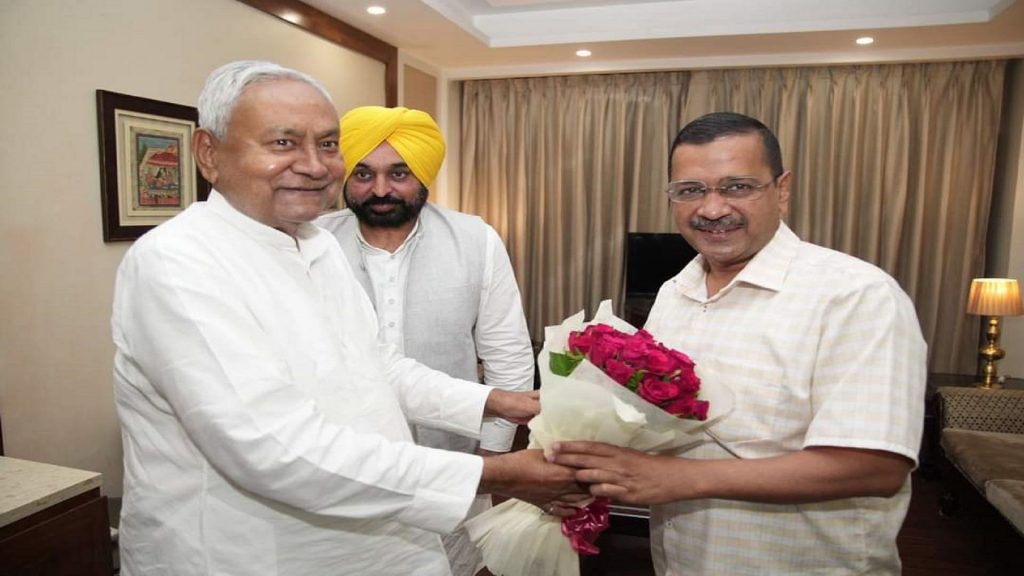
Besides JD-U leader and Bihar Chief Minister Nitish Kumar and his deputy Tejashwi Yadav of the RJD, Jharkhand Chief Minister Hemant Soren of the JMM, Nationalist Congress Party chief Sharad Pawar, Tamil Nadu Chief Minister M K Stalin of the DMK, Shiv Sena UBT MP Priyanka Chaturvedi, and National Conference president Farooq Abdullah attended the event.
West Bengal Chief Minister Mamata Banerjee was invited but she skipped the event. BRS, BJD, AIADMK, AIMIM, YSRCP, TDP and AAP were not invited.
The opposition parties also found a common ground in boycotting the inauguration of the new Parliament building by PM Modi saying the job should have been done by President Droupadi Murmu and slammed the PM for not inviting the President for the ceremony on May 28.
A joint statement of opposition parties said there was no point in attending the inauguration of the new Parliament building when the BJP had sucked the soul out of the institution by silencing the voice of the opposition. Rahul Gandhi said Parliament is not built by “bricks of ego” but through constitutional values.
Nitish Kumar’s role
Nitish is a former BJP ally but over the past weeks, the Bihar Chief Minister and his deputy Tejaswi Yadav interacted with Mamata Banerjee and Arvind Kejriwal to push the opposition unity plan keeping the Congress in the loop.
After the Karnataka results, Nitish Kumar met Congress chief Kharge and former chief Rahul Gandhi in Delhi. Earlier, Nitish Kumar had also met BJD leader and Odisha chief minister Naveen Patnaik, who supports the BJP on specific issues.
“Strong regional parties should take on the BJP in 2024 on their home turf and in turn, they would back the Congress in the 200-odd seats where the two national parties are in direct contest,” Banerjee said.
2023 polls
Before 2024, the Congress hopes the Karnataka results will have an impact in the coming four assembly polls in Madhya Pradesh, Rajasthan, Chhattisgarh and Telangana this year. In three out of these four states, the Congress fights directly with the BJP. In Telangana the grand old party fights the ruling BRS.
The five southern states including Andhra Pradesh, Telangana, Karnataka, Tamil Nadu and Kerala have 129 Lok Sabha seats.
The Congress believes the pro-people promises made in Karnataka convinced the voters and a detailed common minimum programme would have to be worked out along with the other parties to set the agenda for the 2024 national elections.

